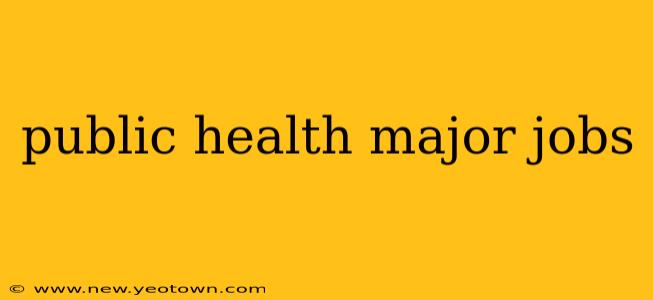Charting Your Course: A Journey Through Public Health Major Jobs
The world of public health is vast and varied, brimming with opportunities to make a real difference. If you're a public health major, you're not just studying a subject; you're choosing a path filled with purpose. But with such a broad field, the question often arises: what jobs are actually out there for public health majors? This isn't just a list; it's a story of the diverse careers waiting for you.
Let's embark on this journey together, exploring the exciting possibilities that await you. We'll uncover the different roles, the required skills, and even touch upon the salary expectations—a crucial aspect for any career path.
What are the most common jobs for public health majors?
This is often the first question on the minds of aspiring public health professionals. The truth is, the "most common" jobs are as diverse as the problems public health tackles. However, some roles consistently appear as popular entry points. These include:
-
Health Educators: Imagine yourself empowering communities to make healthier choices. Health educators design and implement programs that promote healthy lifestyles, disease prevention, and overall well-being. They might work in schools, hospitals, community centers, or government agencies. Think of it as being a detective, identifying health issues within a community and creating a prevention strategy.
-
Epidemiologists: These are the disease detectives of the public health world. They investigate outbreaks, track the spread of illnesses, and identify risk factors to prevent future epidemics. Think of the recent COVID-19 pandemic—epidemiologists were at the forefront, analyzing data, tracking the virus's movement, and guiding public health responses. This is a data-driven role that requires strong analytical skills.
-
Biostatisticians: Behind every public health study and initiative are the biostatisticians, interpreting complex data sets to provide meaningful insights. They use statistical methods to analyze health data, design studies, and draw conclusions that inform public health policies and programs. This role requires a strong mathematical background and an understanding of statistical software.
-
Public Health Analysts: These professionals work to solve public health issues by analyzing data, conducting research, and developing solutions. They might work on projects related to environmental health, infectious disease control, or chronic disease prevention. They are like strategists, evaluating existing programs and designing better ones.
What jobs can you get with a public health degree?
The beauty of a public health degree lies in its versatility. While the roles above are common, the possibilities extend far beyond them. Your degree opens doors to:
-
Environmental Health Specialists: Protecting the environment is crucial to public health. These specialists work to improve air and water quality, manage waste, and ensure safe food handling practices. They’re environmental guardians, ensuring community safety.
-
Community Health Workers: These individuals work directly with communities, providing health education, outreach, and support services. They often work with vulnerable populations, acting as a bridge between healthcare services and the community. They are the hands-on helpers, ensuring everyone receives essential care.
-
Health Policy Analysts: Influencing policy change for better public health outcomes is a powerful role. These analysts research, analyze, and evaluate health policies, advocating for improvements to the healthcare system. They are the advocates, fighting for healthier communities through policy.
What is the job outlook for public health majors?
The job outlook for public health majors is generally positive, with strong growth expected in many areas. The increasing focus on preventative care, emerging infectious diseases, and the aging population creates a consistent demand for skilled public health professionals. The field is ever-evolving, requiring adaptability and continuous learning.
What are the salary expectations for public health majors?
Salaries vary greatly depending on the specific job, location, experience, and education level. Entry-level positions might have lower salaries, but as experience and specialization increase, so does the earning potential. Researching salary ranges for specific roles in your target location is crucial.
What skills are important for a public health job?
Beyond your academic knowledge, several soft skills and technical skills are essential for success in public health:
- Analytical skills: Data analysis and interpretation are central to many public health roles.
- Communication skills: Clearly conveying complex information to diverse audiences is vital.
- Problem-solving skills: Public health challenges require innovative and strategic thinking.
- Collaboration skills: Public health often involves working in teams and with various stakeholders.
The journey of a public health major is not just about finding a job; it's about finding a purpose. The possibilities are vast, the challenges are real, and the rewards are immeasurable. With passion, dedication, and the right skills, you can make a meaningful difference in the world.

